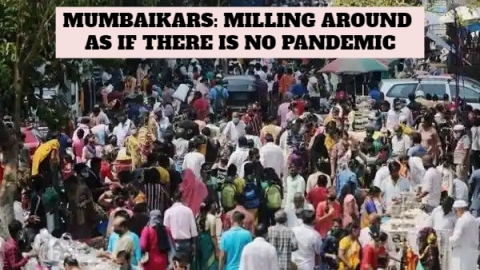

By Linus Garg
First publised on 2021-04-07 09:46:14
In a questionable move, the Maharashtra Chamber of Commerce, Industry and Agriculture (MCCIA) issued a 48-hour ultimatum to the state government to withdraw its order to keep shops selling non-essential items closed in the city till April 30. The government had issued the order to prevent crowding in marketplaces in order to break the Covid chain as the second wave has gone out of control in the state. Most markets in Mumbai see huge crowds throughout the day despite the surge in Covid cases and health protocol is not followed in most of these markets.
But the traders, mainly sellers of computers and peripherals, argue that since the spread of Covid will make work from home the preferred mode of working once again, there will be huge demand for such items and if they are forced to keep their shops shut now, they will suffer huge losses. The traders argue that since ecommerce operations will not be stopped, all their business will go to such platforms.
But the traders must share a part of the blame. After unlock started happening, all market committees (and chambers like MCCIA) became lax and thought that the virus had vanished. They allowed unrestricted entry of people in their markets and shops and did not follow any Covid protocol. They allowed customers without masks, their employees also seldom wore masks and there was provision for sanitizing hands or maintaining physical distance. The administration must also own up as it allowed these markets to function without restrictions. But since the virus has now returned with a vengeance, especially in Mumbai and Maharashtra, the government needs to take all measures it deems fit to stop the rapid spread.
But these localized or specific lockdowns are temporary measures just to break the chain (though one is skeptical about its success). The main thing is to force these markets to follow the health protocols strictly hereafter. The administration needs to monitor these markets, either by patrolling or by CCTV. Any transgression must result in warnings first, then fines and ultimately closure for a specific period. These markets must ensure that employees and customers wear masks at all times, they must provide hand sanitizers and allow entry of as many customers in the shops at a time as can be accommodated while maintaining physical distance.
When pandemics strike, profit cannot be the only motive. Yes the wheels of the economy must be kept running to keep the home fires burning but not at the cost of the health or well-being of the people. The traders must treat this 'mini-lockdown' as a strict warning and brace themselves to do business in the new normal as per the stated rules or prepare themselves for more such closures. The people, and that includes the trading community, have to support the government in its efforts to curb the spread of the virus.











